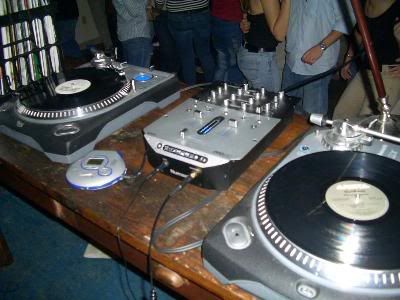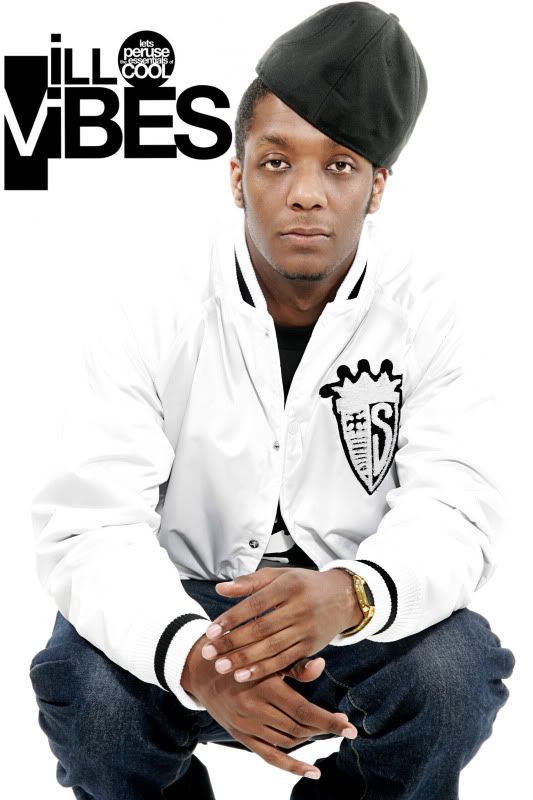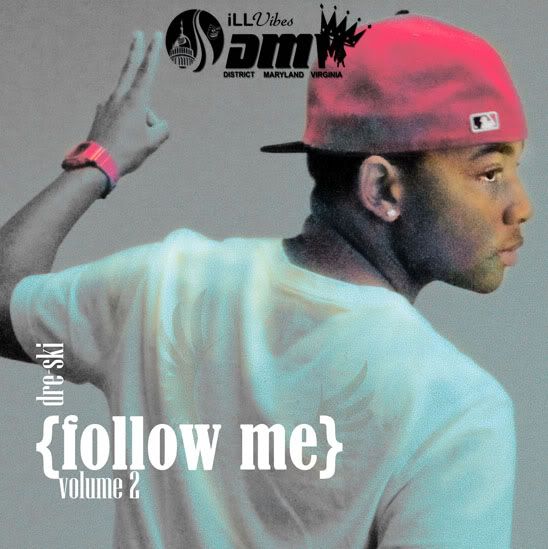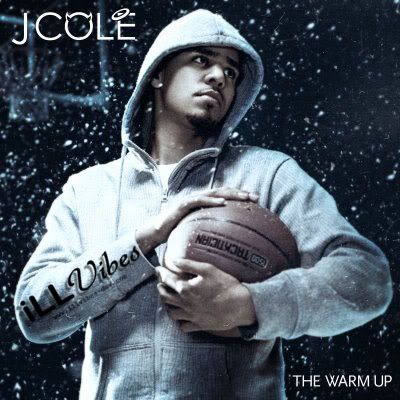 The art of DJing, or turntabilism, is one of the so-called four elements of hip hop, along with rap, the art of breakdancing, and graffiti (tagging). (Beatboxing is also considered to be an element, as well, for some people.) For many years when hip hop was profound, there was no such thing as an MC without a DJ. In fact, when hip hop became prominent in the '70s, the DJ was the source of entertainment, the foundation to the life of the party, with or without the MC. What we knew as MCing back then, when hip hop first originated, was not the same as it is now: an MC back then simply encouraged people to party, by exhorting in between songs or setting the mood by telling jokes. It was the DJ who had the more prominent role by isolating the percussions from a disco or funk song.
The art of DJing, or turntabilism, is one of the so-called four elements of hip hop, along with rap, the art of breakdancing, and graffiti (tagging). (Beatboxing is also considered to be an element, as well, for some people.) For many years when hip hop was profound, there was no such thing as an MC without a DJ. In fact, when hip hop became prominent in the '70s, the DJ was the source of entertainment, the foundation to the life of the party, with or without the MC. What we knew as MCing back then, when hip hop first originated, was not the same as it is now: an MC back then simply encouraged people to party, by exhorting in between songs or setting the mood by telling jokes. It was the DJ who had the more prominent role by isolating the percussions from a disco or funk song. As with anything, the art of DJing evolved, with many prominent figures rising up to create innovations within this art. DJ Kool Herc is credited with being the first hip hop DJ, coming on the scene and becoming known for his technique to extend the breaks within songs by using a mixer and two identical records, a style to be mimicked by many other DJs (the "break-beat"). About the same time, Afrika Bambaataa (of the Zulu Nation) and Grandmaster Flash became prominent within the hip hop community, with Afrika becoming the first to use a synthesizer on a record (and ultimately creating electro) and Flash inventing such techniques as cutting (another form of "break-beat"). It was a mentor of Flash's who finally developed what we call scratching - Grand Wizard Theodore. With the help of Grandmaster Flash, the Grand Wizard revolutionized the art of scratching and made it known to the public.
As with anything, the art of DJing evolved, with many prominent figures rising up to create innovations within this art. DJ Kool Herc is credited with being the first hip hop DJ, coming on the scene and becoming known for his technique to extend the breaks within songs by using a mixer and two identical records, a style to be mimicked by many other DJs (the "break-beat"). About the same time, Afrika Bambaataa (of the Zulu Nation) and Grandmaster Flash became prominent within the hip hop community, with Afrika becoming the first to use a synthesizer on a record (and ultimately creating electro) and Flash inventing such techniques as cutting (another form of "break-beat"). It was a mentor of Flash's who finally developed what we call scratching - Grand Wizard Theodore. With the help of Grandmaster Flash, the Grand Wizard revolutionized the art of scratching and made it known to the public. With the presence of Grandmaster Flash in the public (along with the Furious Five) and especially the role of Grand Mixer DXT in the 1983 Herbie Hancock song "Rockit," the DJ was here to stay. Throughout the 1980s, it was difficult to hear a song without the art of scratching adding to the melody. Since the beginning, the art of DJing has risen to become a grandiose art, with limitless variations of scratching (e.g., the rise of transformer scratching in Philly, with such originators as DJs Spinbad, Cash Money, and Jazzy Jeff) and numerous styles, all the while creating a cult of DJs who not only premiere themselves at parties but also compete in national competitions. And while the role of DJing has almost faded a bit (with less and less hip hop artists utilizing them as part of a group, as was the practice with a Run-DMC or Rakim and Eric B or the Beastie Boys), a unique sub-culture has grown to form a heavyweight cast of DJS who are willing to go on their own and explore their skills, much in the same hip hop originally started with the DJ as the solo individual. So in the '90s, you see the rise of such great DJs as Q-Bert (personally my favorite DJ), A-Trak (who is now Kanye's DJ but who is known for being a national DJ champion at the age of 15), and Prime Cuts; and even crews such as the X-Ecutioners, The Allies, and the Beat Junkies.
With the presence of Grandmaster Flash in the public (along with the Furious Five) and especially the role of Grand Mixer DXT in the 1983 Herbie Hancock song "Rockit," the DJ was here to stay. Throughout the 1980s, it was difficult to hear a song without the art of scratching adding to the melody. Since the beginning, the art of DJing has risen to become a grandiose art, with limitless variations of scratching (e.g., the rise of transformer scratching in Philly, with such originators as DJs Spinbad, Cash Money, and Jazzy Jeff) and numerous styles, all the while creating a cult of DJs who not only premiere themselves at parties but also compete in national competitions. And while the role of DJing has almost faded a bit (with less and less hip hop artists utilizing them as part of a group, as was the practice with a Run-DMC or Rakim and Eric B or the Beastie Boys), a unique sub-culture has grown to form a heavyweight cast of DJS who are willing to go on their own and explore their skills, much in the same hip hop originally started with the DJ as the solo individual. So in the '90s, you see the rise of such great DJs as Q-Bert (personally my favorite DJ), A-Trak (who is now Kanye's DJ but who is known for being a national DJ champion at the age of 15), and Prime Cuts; and even crews such as the X-Ecutioners, The Allies, and the Beat Junkies.  In no way could I, in one sitting or in one blog post, explain the entire history of the DJ or the various DJ techniques, nor do I have the comprehensibility to know all the various techniques, as it is an art form that evolves each and every day, with incredible individuals diligently exploring the limits (perhaps there are none?) of DJing. While in college, I dabbled in a bit of DJing and threw my own parties, and it was the inexplicable thrill (more so than the money) of entertaining people that always intrigued me. Peep my set-up below:
In no way could I, in one sitting or in one blog post, explain the entire history of the DJ or the various DJ techniques, nor do I have the comprehensibility to know all the various techniques, as it is an art form that evolves each and every day, with incredible individuals diligently exploring the limits (perhaps there are none?) of DJing. While in college, I dabbled in a bit of DJing and threw my own parties, and it was the inexplicable thrill (more so than the money) of entertaining people that always intrigued me. Peep my set-up below:
With the rise of digital music, though, a controversy has plagued the DJ community, almost sequestering certain DJs and creating rivals within the industry. You have your so-called pure DJs (which I consider myself to be, although lacking in skills) who simply use vinyls; there are those who use CDs; there are those who strictly use their laptops without the mixer/turntables; and then, there are those digital DJs who are able to play their digital music through their vinyl or CD turntables. The rise of Scratch Live, created by Serato, has revolutionized the digital DJing technique, and this digital revolution has gotten only crazier. Nowadays, people may even be able to throw parties (even with all the scratching and blending) through their iPod Touch or iPhone:
One thing is for certain: the art of DJing, the very reason we have hip hop, will continue to grow and, like all great arts that have left an indelible mark on the world, will continue to stay. For more information on this art, perhaps you can buy or rent the 2001 documentary on the art of DJing called Scratch. The trailer for it is below:
Here's just a sample from DJ Q-Bert, the DJ who heavily influenced me to dabble in the art form (by the way, his DVD tutorials are incredible):


















































